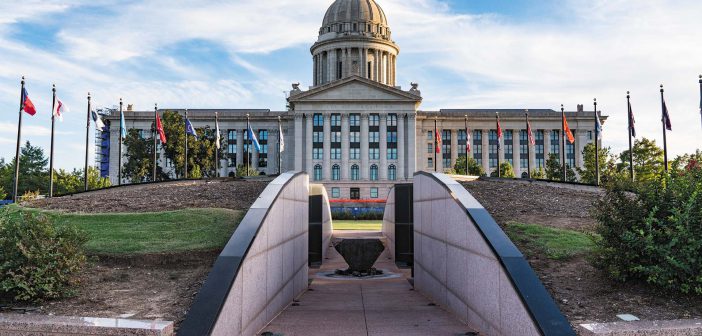by Kati Siconolfi, Director, State & Local Government Affairs and Peter Clerkin, Director of Communications
Oklahoman hoteliers celebrated a significant victory in early April as they successfully fought back a $5 per night hotel tax. Facing a showdown with state teachers over education funding, the famously tax-averse state legislature, which had not passed a tax increase since 1990, devised a $447 million revenue package that included the hotel tax.
For the better part of this year, Oklahoma’s government has been mired in a standoff with educators over a decade’s worth of cuts to education funding and some of the lowest teacher salaries in the nation. State officials estimated that the hotel tax would generate $50.4 million annually, providing $46.2 million for the FY2019 budget. As it became apparent that a significant number of lawmakers viewed the hotel tax as an easy revenue generator, hoteliers began calling and writing to their elected officials urging them to consider the negative impacts that additional per night fees could have on the lodging industry. If the lodging tax were implemented, it could have pushed hotel tax rates in Oklahoma City and Tulsa higher than those in Los Angeles, Calif., Chicago Ill., and even New York City.
According to STR, average daily rates (ADR) for Oklahoma hotels remain lower than the $127 national average (through August 2017), which is attractive to prospective conventions and events. ADR in Oklahoma City is $83 and $81 in Tulsa. However, on top of the city and state taxes, many Oklahoma cities charge an additional occupancy tax. In Oklahoma City for example, the combined taxes on hotel rooms is 14.13 percent. On a $100 per night room, an additional $5 tax would effectively raise the tax rate on the room to nearly 20 percent. Despite the attractiveness of below average ADR, hoteliers feared that the sight of higher taxes could lead prospective guests to look elsewhere.
In their meetings with lawmakers, hoteliers shared their support for increasing salaries for state teachers and education employees, but they were apprehensive about the prospect of the new tax and higher rates discouraging conventions, sporting events, and tourists from visiting the state. Relying on hotel tax revenues to meet statutory funding obligations runs the risk that higher occupancy taxes could eventually lead to decreased revenues because of business lost to neighboring states, an irony that seemed lost upon some of the lawmakers backing the proposed tax.
Hotelier opposition to the tax also stemmed from its regressive nature. It would be applied equally to hotels regardless of their classification. For example, an additional $5 tax would affect smaller economy hotels with lower daily rates significantly more than upscale or luxury hotels.
Despite substantial political education efforts by hoteliers and the lodging industry, the Oklahoma House passed the revenue bill, HB1010XX, which included the $5 hotel tax, but hoteliers would not be deterred. On the morning of March 28, over 100 Oklahoma hoteliers rallied at the state capitol in Oklahoma City. AAHOA members were instrumental in helping state organizations, such as the Oklahoma Hotel and Lodging Association, demonstrate a notable presence as the state Senate debated HB1010XX. AAHOA members used the opportunity to visit with their state senators, attempting to get them to strike the hotel tax from the revenue bill.
The Senate, which requires a three-fourths majority to pass a tax increase, eventually reached the thirty-six-vote threshold to pass the tax increase which included the hotel tax. According to Gov. Mary Fallin (R), “The revenue package that funded the teacher pay raises would not have passed the Senate with the required super majority, or three-fourths support, had a bipartisan agreement not been struck to repeal the hotel/motel tax.” The tax increase was passed only with assurances that another vote to repeal the hotel tax would be held immediately as lawmakers expressed wariness regarding how the tax would impact state businesses. House Speaker Charles McCall (R) said that separate legislation (HB1012XX) would be introduced to eliminate the hotel tax and create other revenue streams. The repeal bill passed the House on a party line vote, but forward-thinking senators engineered a bipartisan coalition in the state Senate to pass the bill with only a handful of “no” votes. Gov. Fallin signed the repeal into law on April 10.
“When Oklahoma hoteliers took action, our leaders repealed the hotel tax. When we work together, we can make a positive difference for our industry,” stated Arti Patel, Vice President of Sales and Marketing for Pristine Hospitality.
It can be difficult to quantify the effects of advocacy and engagement with elected officials. So much of big policy often seems predetermined by party leaders and colored heavily by partisan ideology. In this instance though, through hard work, AAHOA members and the Oklahoma hospitality industry lobbied against and defeated a seemingly niche issue in a broader legislative package with significant popular support. In the leadup to the vote, AAHOA members wrote over 1000 letters to their lawmakers, made countless phone calls, held numerous meetings with them, and, when it came down to it, showed up to protest the measure at the capitol in Oklahoma City.
At first glance, engaging with one’s elected officials can seem an intimidating and futile effort. But with conversation comes understanding as lawmakers start to appreciate the nuance of industry and the significant impact that easy revenue generators, such as a hotel tax, could have on their state’s economy. The hotel tax repeal in Oklahoma is yet another demonstration of how, through advocacy, hoteliers are stronger together and can not only educate and influence the creation of good policy, but also halt the creation and implementation of policies that would hurt the industry, the economy, and the community.
While the defeat of this hotel tax is encouraging, hoteliers across the nation can expect to see similar tax proposals as lawmakers look to offset budget shortfalls and cuts affecting popular government services, such as education or transportation, with quick and ill-conceived revenue-generating measures. Hoteliers must be prepared to organize, educate, and act. ■
PHOTO CREDIT: PAUL BRADY PHOTOGRAPHY/SHUTTERSTOCK.COM




